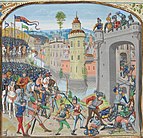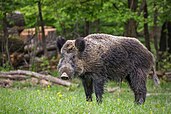From today's featured articleThe Battle of Caen on 26 July 1346 was an assault on the French-held town by a force of archers and men-at-arms, part of an invading English army under King Edward III during the Hundred Years' War. This force, nominally commanded by the Earls of Warwick and Northampton, was eager for plunder, and attacked against orders, before the rest of their army was in position. Caen was garrisoned by 1,000–1,500 soldiers and a large number of armed townsmen, commanded by Grand Constable of France Raoul, the Count of Eu. The town was captured in the first assault; over 5,000 of the ordinary soldiers and townspeople were killed and a small number of nobles were taken prisoner. After sacking the town for five days, the army marched to the River Seine, and by 12 August they were 20 miles (32 kilometres) from Paris. After turning north they heavily defeated the French at the Battle of Crécy two weeks later, and commenced the successful siege of Calais the following week. (This article is part of a featured topic: Crécy campaign.)
Recently featured:
Did you know ...
|
In the news
On this dayJuly 26: Independence Day in Liberia (1847)
|
From today's featured list
Suines are members of the clade Suina, also known as Suiformes, a suborder of omnivorous, non-ruminant hoofed mammals in the order Artiodactyla. The clade includes the family Suidae, termed suids or colloquially pigs or swine, as well as the family Tayassuidae, termed tayassuids or peccaries. Suines are largely native to Africa, South America, and Southeast Asia, with the exception of the wild boar (example pictured), which is additionally native to Europe and Asia and introduced to North America and Australasia, including widespread use in farming of the domestic pig subspecies. Suines range in size from the 55 cm (22 in) long pygmy hog to the 210 cm (83 in) long giant forest hog, and are primarily found in forest, shrubland, and grassland biomes, though some can be found in deserts, wetlands, or coastal regions. The 21 extant species of Suina are split between the Suidae family, containing 18 extant species belonging to six genera, and the Tayassuidae family, containing three species in three genera. (Full list...)
Today's featured picture

|
The Japanese government-issued dollar was a form of currency issued between 1942 and 1945 for use within the territories of Singapore, Malaya, North Borneo, Sarawak and Brunei, under occupation by Imperial Japan during World War II. The currency, informally referred to as "banana money", was released solely in the form of banknotes, as metals were considered essential to the war effort. The languages used on the notes were reduced to English and Japanese. Each note bears a different obverse and reverse design, but all have a similar layout, and were marked with stamped block letters that begin with "M" for "Malaya". This 1945 one-hundred-dollar Japanese-issued banknote, depicting labourers in a rubber plantation on the obverse, and stilted Malay houses on the reverse, is part of the National Numismatic Collection at the Smithsonian Institution. Banknote design credit: Empire of Japan; photographed by Andrew Shiva
Recently featured:
|
Other areas of Wikipedia
- Community portal – Bulletin board, projects, resources and activities covering a wide range of Wikipedia areas.
- Help desk – Ask questions about using Wikipedia.
- Reference desk – Serving as virtual librarians, Wikipedia volunteers tackle your questions on a wide range of subjects.
- Site news – Announcements, updates, articles and press releases on Wikipedia and the Wikimedia Foundation.
- Village pump – For discussions about Wikipedia itself, including areas for technical issues and policies.
Wikipedia's sister projects
Wikipedia is hosted by the Wikimedia Foundation, a non-profit organization that also hosts a range of other projects:
-
Commons
Free media repository -
MediaWiki
Wiki software development -
Meta-Wiki
Wikimedia project coordination -
Wikibooks
Free textbooks and manuals -
Wikidata
Free knowledge base -
Wikinews
Free-content news -
Wikiquote
Collection of quotations -
Wikisource
Free-content library -
Wikispecies
Directory of species -
Wikiversity
Free learning tools -
Wikivoyage
Free travel guide -
Wiktionary
Dictionary and thesaurus
Wikipedia languages
This Wikipedia is written in English. Many other Wikipedias are available; some of the largest are listed below.
-
1,000,000+ articles
-
250,000+ articles
-
50,000+ articles




